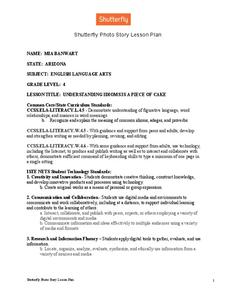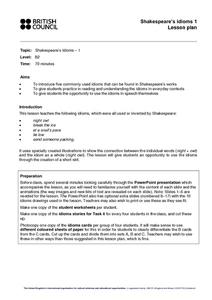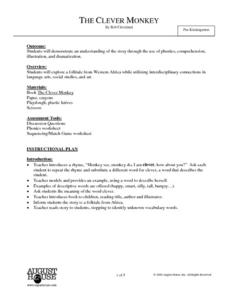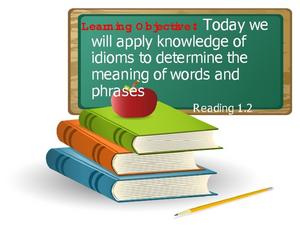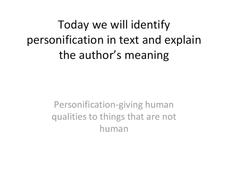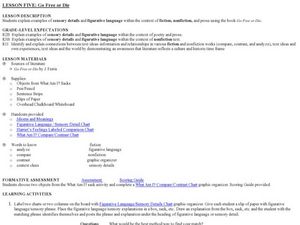K12 Reader
Animal Proverbs and Adages
What will play when the cat's away? Practice figurative language with a list of proverbs about animals. Kids use the word bank at the top of the page to fill in the blanks based on their knowledge of common phrases.
K12 Reader
Proverbs and Adages Match
The grass may be greener on the other side, but a worksheet about proverbs and adages is sure to help readers of all levels master figurative language. Kids match the idioms in the first column to their literal meanings in the second...
Shutterfly
Photo Story Lesson Plan
After reading Loree Leedy's There's a Frog in My Throat: 440 Animal Sayings a Little Bird Told Me, kids create and illustrate their own poems that convey the meaning of an idiom. The poems are then transferred into Shutterfly's Photo...
Shutterfly
Shutterfly Photo Story Lesson Plan
A reading of Peggy Parish's Amelia Bedelia launches a study of idioms. Groups then select several idioms, write the meaning of the expressions, draw or select images, and use GIMP or Photoshop to create an idiom book.
Achieve3000
Context Clues and Idioms
Kids practice using five types of context clues (definition, synonym, antonym, example, and general) to decode idiomatic language.
British Council
Shakespeare’s Idioms
Lie low. Break the ice. He's a night owl. Idioms, in this case idioms created by Shakespeare, are the focus of resource that includes a PowerPoint presentation, an activity, and a brief lesson, all intended to give kids a chance to...
August House
The Clever Monkey
Your clever kindergartners will enjoy a series of activities based on the West African folktale, The Clever Monkey, adapted by Rob Cleveland. They sequence the story with pictures, copy sentences, illustrate idioms about cats,...
August House
The Clever Monkey Rides Again
Use a West African folktale to practice several different skills in your first grade classroom. Learners read The Clever Monkey Rides Again and focus on rhyming words, reading comprehension, measurement, art, movement, and word...
Film English
Father and Son
Explore word relationships and the relationships between people with an interesting lesson. Learners practice pairing words that typically go together and write brief narratives using these words. They then go through a similar process,...
Curated OER
Figurative Language
Play a figurative language game! Starting with a review of terms, this presentation quickly launches into a quiz game with hyper-linked answers. Simply click an answer to find out if it's wrong or right. The option to try again is always...
Curated OER
Using Words: Verbal Communication
Written and verbal communication is the topic for today. The class goes over various facets of verbal communication, such as plain English, active voice, passive voice, cliché, and jargon. They then use those devices as they discuss...
Curated OER
Figures of Speech: Quiz 2
Hyperbole, simile, metaphor, and personification are spotlighted on an online/interactive quiz. Test takers read short passages and then identify the figures of speech used.
Curated OER
Knowledge of Idioms
What is an idiom, and why is it necessary that we know and understand them? This brief PowerPoint helps answer these questions by looking at examples and offering a strategy for reading new text that might contain an idiom. The final...
Curated OER
Literary Terms
Seriously, 93 slides of literary terms? Yes, and well worth the time, although perhaps not all at once. The beauty here is in the concise, easy-to-understand definitions for such well-known terms as imagery and personification, as well...
Curated OER
Irony in "The Gift of the Magi"
Use O. Henry's ubiquitous tale of love and poverty to explore irony. After reading the story, middle schoolers identify examples of all three kinds of irony in the story. With partners, they brainstorm original examples of irony. Then...
Curated OER
Personification
Introduce your young scholars to personification. The literary device is clearly defined and illustrated with clever examples. Opportunities for guided and independent practice using poems by Emily Dickinson and Langston Hughes are also...
Curated OER
Lesson 3: Idioms
You're as cute as a bug. But are you really as cute as a bug? Bugs aren't cute! Idioms are fun nonliteral phrases that mean something different than the words they contain. Second graders learn about idioms as they read the book, More...
Curated OER
Go Free or Die: Figurative Language
Figures of speech, sensory details, and academic language are all targeted while reading Chapter Two of J. Ferris’ Go Free or Die. First, learners engage in an exercise to practice describing with detail. Then, partners use a...
Curated OER
Theater: Create a Script
Figurative language is the focus in the book Teach Us, Amelia Bedelia. After reading Peggy Parish's book, class members dramatize idioms from the text, using dramatic strategies such as characterization, exaggeration, and...
Curated OER
Eating Up Idioms
Ah, food idioms! Now that sounds tasty. Class members read and discuss various food-related idioms, create an illustration of a food-related idiom, and develop a class book or bulletin board to celebrate figurative language and National...
Curated OER
English Expressions Quiz: Online
An online learning exercise provides opportunities to assess comprehension of 10 common adages like "A bird in the hand is worth two in the bush" or "Variety is the spice of life." Learners complete a multiple choice quiz (and can check...
Curated OER
Comparisons: Well-Known Sayings
How familiar is your class with basic idioms? Eight idioms and their explanations are listed here, and learners must match each explanation with the correct idiom. Looking for a way to extend this activity? Have your learners choose one...
Curated OER
Idioms in Everyday Language
Students describe idioms and their use in everyday language. They describe the difference between literal and idiomatic meanings. In groups, students use iPhoto to create books that explain and illustrate a variety of idioms describing...
Curated OER
Common Idioms 5
If you have been analyzing idioms, you can assess your learners' grasp of their figurative meanings with this 10-question matching exercise. Or you could give the sheet to groups to foster discussion about literal versus figurative...




